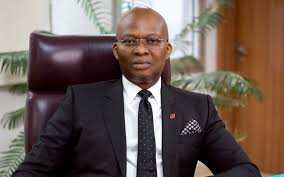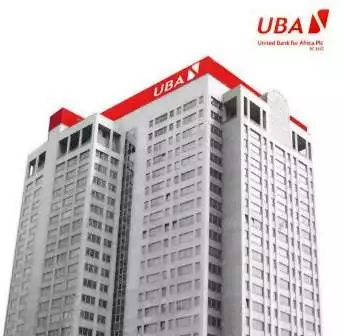The United Bank for Africa, UBA Plc has failed to impress global rating firm, Fitch which has revealed that there is no improvement in the fortunes of the bank since March this year when it downgraded the commercial bank as stressed.
The lender was, six months ago, placed under the Rating Watch Negative, RWN list of stressed banks in the country after it was rated ‘B’ by the foremost rating agency.
Few days ago, Fitch released its new rating for Nigerian banks where it affirmed the Kenneth Uzoka-led bank ‘B’, meaning that the probability of default in UBA’s core operational areas, is still very high financial analysts say.
The globally renowned credit rating agency, however, reaffirmed competitor, Stanbic IBTC Holdings PLC and its subsidiary, Stanbic IBTC Bank PLC National Long-Term ‘AAA (nga)’ and National Short-Term ‘F1+(nga)’ ratings.
“The implication of ‘B’ affirmation for UBA is that even though the bank’s financial commitments are currently being met however, customers cannot rely on its capacity for continued payment which is vulnerable to deterioration in the long term,” an analyst said
The negative rating came after the bank said it was embarking on reform to sanitize its workforce and improve performance. No fewer than 2000 employees were sacked last December, in a major sweep after the management said they were no longer useful for its operation moving forward.
The sack, also generated huge furore in the sector after the chairman of the bank, Tony Elumelu called the sacked workers ‘toxic’ employees who are no longer required by the lender in its quest to remain among the biggest banks in the country.
Surprisingly, the bank which prides itself as Africa’s Global Bank, had immediately after it relieved the employees of their appointments, increased the salaries and allowances of all its directors by close to 200 per cent, a decision the management said was necessary to unleash their optimal performance.

The magazine learnt that Elumelu, Uzoka and other top management staff are beneficiary of the multi-billion bumper pay packet that has continued to keep tongues in the sector waging, as to why the bank took such decision.
Obviously, the recipients of the big pay have not been able to turn the fortunes of the bank around, considering that many months down the line, the lender has yet to impress in core operational areas, according to Fitch which said stressed signs are still very visible, therefore warning “of receding near-term risks to the bank’s credit fundamentals from the economic fallout arising from the oil price crash and coronavirus pandemic.”
The respected agency warned customers and shareholders that the economic headwinds in the country have “heightened” UBA’s “level of risk in doing banking business and resulting risks to its financial performance over the next 12-18 months.”
The management of the bank said in January that it increased the salaries and allowance of its directors, to keep them at the top level of performances, as part of the holistic reforms to improve the lender’s fortunes.
“Over 5,000 staff of the United Bank for Africa (UBA) Plc, started the new year with a lot of cheer as the bank yesterday announced its promotion to new grades as well as salary upgrades with immediate effect this January.
“Those who are beneficiaries of this exercise will receive up to 170% increase in their salaries and benefits, whilst a good number have been moved to higher grade levels,” Nasir Ramon, the bank’s spokesman said of the pay increase 10 months ago.

Ramon said sacking the former employees was part of efforts to turn around the bank because through the “carefully planned restructuring embarked upon by the bank in the last quarter of 2019, UBA has transformed its grading system and processes to become one of the most competitive within the industry.”
Fitch seemed not to be impressed even though it has removed the bank from its watch-list, as temporary breeder, experts say, not to further ‘depressed’ customers and shareholders by highlighting embedded stress indicators.
The rating agency said in its latest reports that the bank has manage to survive implosion due to assistance from the Central bank of Nigeria, CBN, but warned that such cannot guarantee its stability in the long run.
Fitch said “In our opinion the impact of the economic downturn on UBA’s credit profile is tolerable at the bank’s current rating level and it will take several quarters before the full extent of the crisis on corporates and households is seen in its financial metrics.
“Since our previous rating action in March, regulatory forbearance on asset classification and banks’ own debt relief measures have significantly eased pressures on the sector’s asset quality.
“Debt relief measures are, nevertheless, temporary and with the eventual easing of fiscal and monetary support from the Central Bank of Nigeria (CBN), we see a material risk that bank asset quality could deteriorate faster, unless economic recovery gathers pace.”
“What Fitch ‘B’ ratings means is that UBA barely escaped the ‘CCC’ category, the bottom down class when the fear of depression is very high for any bank labeled as such. Definitely, one step to be categorized as a substantial credit risky bank is not good for UBA” Adegbenga Ibiyemi, a financial analyst told the magazine.
The bank increased the salary and allowances of its directors by close to 200 per cent early this year; from N18 million to N50 million, according to the half year report presented to the Security and Exchange Commission, SEC recently.
“The current mood in the bank does not justify the fat cheques being received by the directors. The bank’s position that the increase in pay of top echelon is a good business decision has been proven wrong in the light of Fitch’s disposition.
“The meaning of this is that, the colossal investment has failed to reflect in the bank’s bottom line. One would have expected the management of UBA to make good business decision for the sake of customers and shareholders,” an analyst said.
He said the bank’s “salary and allowance binge for directors does not, in any way, show empathy for the employees sacked last year as part of what many considers an austerity measures by UBA to cut down costs.”
The jumbo pay has also unjustly added billions to the bank’s books without corresponding results, he said.
Ramon Nasir, the bank’s spokesman did not respond when the magazine reached out to him to comment on the issue.
Discover more from The Source
Subscribe to get the latest posts sent to your email.








